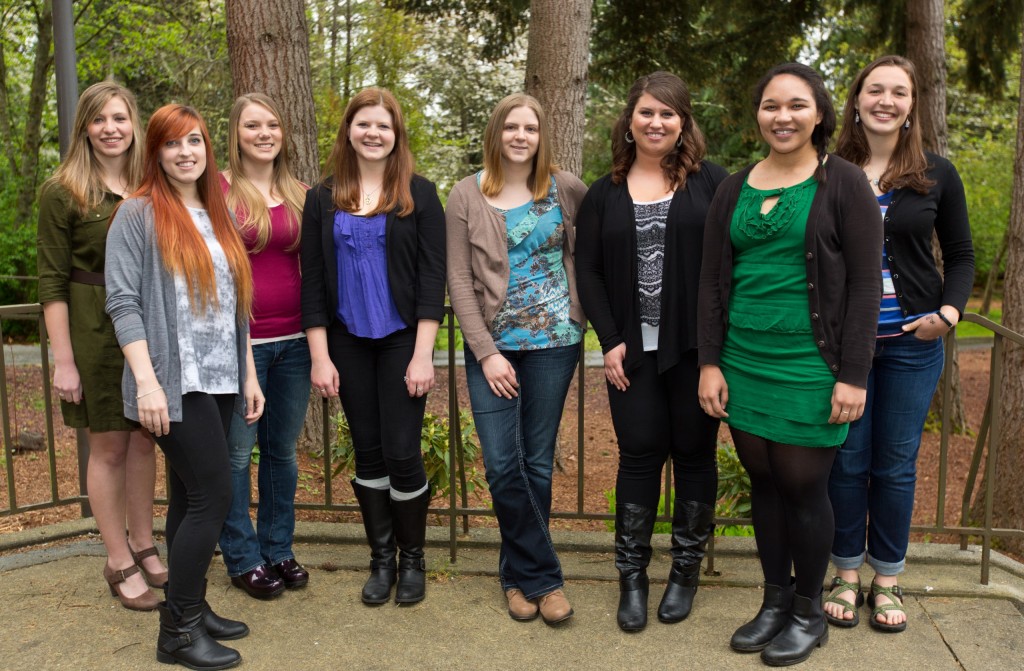Page 13 • (12,266 results in 0.031 seconds)
-

On the Path to Peace Communication Professor Amanda Feller’s peace-building cohort, all graduating in 2014, comes together at PLU. From left: Caitlin Zimmerman, Lauren Corboy, Sydney Barry, Kendall Daugherty, Rachel Samardich, Rachel Espasandin, Jessica Sandler and Anna McCracken. (Photo: John Froschauer/PLU) Eight Graduating Women Give…
2014, magna cum laude. Peace-building experience: Barry was inducted into Lambda Pi Eta, the Communication Honor Society, and completed Basic Mediation Training through the Pierce County Center for Dispute Resolution. She is now participating in the full year-long practicum to become a certified mediator. Her peace philosophy: “I’ve always been interested in conflict and communication—interpersonally and globally—how conflict comes about and how we can learn to better handle it,” Barry said. “We
-
The Commencement ceremony is a celebration of the Pacific Lutheran University community and all it represents.
Symbol and RitualThe Commencement ceremony is a celebration of the Pacific Lutheran University community and all it represents. It opens with the setting of the stage, including banners and symbols representing aspects of the University. The Color Guard of the Lute Battalion of the Army Reserve Officers’ Training Corps initiates the setting of the stage: The flags of the United States and the State of Washington represent the people the ROTC guards are sworn to protect, and the guards on either
-
Performing in Washington and British Columbia The PLU Choir of the West will be on tour in Washington and British Columbia later this January and in early February. The repertoire for this year’s Choir of the West tour spans many stylistic eras and genres. Audience…
The Choir of the West takes to the road Posted by: Mandi LeCompte / January 21, 2013 January 21, 2013 Performing in Washington and British Columbia The PLU Choir of the West will be on tour in Washington and British Columbia later this January and in early February. The repertoire for this year’s Choir of the West tour spans many stylistic eras and genres. Audience members will hear premiere performances of three works: Exultate, by PLU choral faculty member Brian Galante; Northern Lights, by
-
The haves and the have nots, closing the gap The statistics, especially given the economic meltdown on Wall Street in the past few weeks, are not encouraging. Since the 1970s, incomes in the United States have been dramatically pulling apart, as the rich get richer,…
September 29, 2008 The haves and the have nots, closing the gap The statistics, especially given the economic meltdown on Wall Street in the past few weeks, are not encouraging. Since the 1970s, incomes in the United States have been dramatically pulling apart, as the rich get richer, and the poor and middle class fall further and further behind.“The incomes are as unequal in American as they have ever been in history,” said Professor Peter H. Lindert, who will speak on campus next week. “The
-
The Choir of the West is the premier choral ensemble of the Department of Music at Pacific Lutheran University, located in Tacoma, Washington.
Sven-David Sandström’s Matthauspassion (2016). In April of 2018 the choir spent a week with Ešenvalds in residence at PLU, collaborating to record a new compact disc of his unaccompanied works entitled There Will Come Soft Rains, which was released on the Signum Classics label in January of 2020. This album has received accolades in numerous reviews. The Choir of the West is comprised of undergraduate students from a variety of academic disciplines. The choir performs several concerts each year
-
Student Residential Hall building emergency fire evacuation drills are conducted twice (2X) a year on the second week of the Spring (February) and Fall (September) terms.
Calendars for the 2024-25 Emergency Preparedness Drills: Fall 2024: Earthquake Drill – The Great Washington ShakeOut: Thursday, October 17th, 2024 at 10:00am Spring 2025: Lockdown Drill: Wednesday, February 12th, 10:00am Non-Residential Campus Buildings Fire Evacuation Drill: Thursday, March 20th, 2024 at 11:25am Training Available Through Pierce CountyPierce County Emergency Management offers various emergency response training courses throughout the year. Please view their website periodically for
-

The Prologue The Prologue https://www.plu.edu/resolute/spring-2018/wp-content/uploads/sites/26/2018/05/malia-oshiro-cover-prologue-1024x427.jpg 1024 427 Kari Plog '11 Kari Plog '11 https://www.plu.edu/resolute/spring-2018/wp-content/uploads/sites/26/2018/04/kari-plog.jpg May 1, 2018 May 21, 2018 At the start of each school year, Malia Oshiro ’13 proudly introduces herself as a first-generation college graduate. It’s the prologue to her career as an English teacher, a pivotal piece of her story
-

reThinking how sustainability is taught at PLU using a novel approach at reDesign House. The art of sustainability By Chris Albert Across the street from the Martin J. Neeb Center sits an old house – not built to the exacting LEED environmental standards of Neeb,…
. But take a closer look and the differences come to light. Rain barrels on each corner of the exterior collect water from the gutters to be repurposed elsewhere. The paint on the exterior of the house makes rainwater bead up, and when it drips off, it naturally washes dirt from the house. There are big plans for this PLU-owned property, called the “reDesign House.” The goal is to take this vacant single-family residence and turn it into a creative space where students, faculty and staff can work
-
Sludge from the grill to be recycled The gooey mess which sloughs from the grill at the UC may look like something that you’d rather just toss and forget about. But to Wendy Robins and Colin Clifford, it’s pure gold. Or more specifically, the yellow…
grease trap in the drains in most fast food and industrial food companies, he said. Think the grease from the plates or that comes off through the dishwasher. “It’s really disgusting grease,” he said. But it’s obvious he considers it an opportunity. “Obviously, we’re not trying to solve the world’s problems,” Clifford said. “But we are trying to take grease out of the landfills. We believe sustainability is critical to us. And we want to create a fuel for regional use.” Read Previous Tutoring program
-
Located at 12180 South Park Avenue in Tacoma, the Scandinavian Cultural Center is a 6,700 square foot facility housed on the first floor of the University Center at Pacific Lutheran University.
About the Scandinavian Cultural CenterWhat is the SCC?Located at 12180 South Park Avenue in Tacoma, the Scandinavian Cultural Center is a 6,700 square foot facility housed on the first floor of the University Center at Pacific Lutheran University. Completed in May 1989, the Center features a great hall, three exhibit galleries, and a demonstration kitchen. A 25-foot-high, custom-carved Viking ship prow serves as a dramatic visual statement, welcoming guests to the Center. The Cultural Center
Do you have any feedback for us? If so, feel free to use our Feedback Form.


